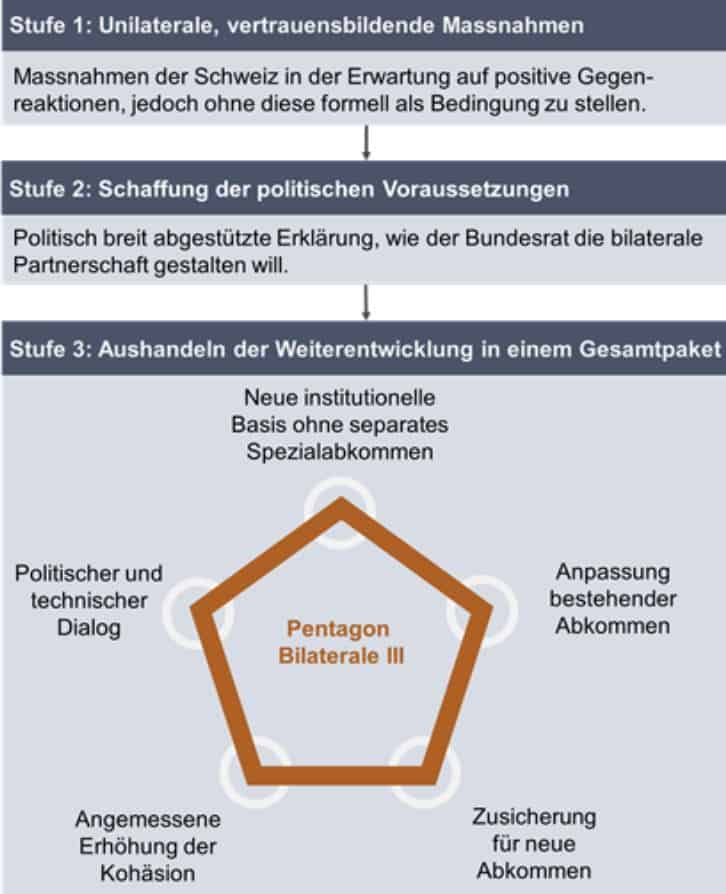Switzerland - EU: Three-stage ETH plan to provide further assistance
Following the breakdown of negotiations on a framework agreement, ETH researchers outline a three-stage plan for the further development of a constructive partnership between Switzerland and the European Union.
More than two months after the Federal Council's decision to break off negotiations on the Framework Agreement, things have become quiet regarding Switzerland's future relations with the European Union. Despite the EU Commission's decision to treat Switzerland as a non-associated third country in the EU Framework Programmes for Research and Innovation (see ETH News from 14.7.2021), hardly anyone is talking about what to do next.
This summer silence has now been broken by two ETH researchers. In a new contribution to the discussion, ETH professor Michael Ambühl and postdoctoral researcher Daniela Scherer from the Professorship for Negotiation Management which options are most likely to succeed from a negotiation theory perspective. "We have outlined a three-stage plan for how the partnership between Switzerland and the EU could develop after the negotiations broke down in May," Ambühl explains.
Strengthening trust through unilateral measures
As a first step, mutual trust between Switzerland and the EU should be strengthened through unilateral measures. The authors recommend that the Federal Council first intensify exchanges with Brussels and with European capitals, as it has already begun to do.
In addition, according to the authors, it would make sense for Parliament to release the so-called cohesion billion, fully normalise the free movement of persons with Croatia and cooperate more closely with the EU in pandemic management and climate protection. At this stage, Scherer believes, everything should also be done "to ensure that research cooperation can once again take its rightful place.

Clarifying the European political vision
In the second stage of Ambühl and Scherer's plan, the Federal Council should draw up a declaration with the broadest possible domestic political support on how it intends to shape the bilateral partnership with the EU in the future. This would therefore also have to be approved by the Swiss parliament in the form of a declaration or a planning resolution.
"The European policy vision supported by parliament would strengthen the Federal Council's credibility vis-à-vis the EU and pave the way for further negotiations," Scherer said. It would express Switzerland's willingness to negotiate a new institutional arrangement for the bilateral path as part of an overall package that also takes due account of Switzerland's special characteristics as a non-member.
Putting together a new negotiating package
In the third stage, the plan envisages Switzerland reopening negotiations with the EU. In order to increase the scope of the negotiations and thus facilitate a balance of interests between the two parties, a negotiation package would have to be as broad as possible. If the "Umbrella Agreement" required for association to Horizon Europe has not yet been negotiated by then, this should take place here at the latest.
However, a core component of this five-area overall package, which the authors call Bilateral III, remains above all the renegotiation of an institutional basis for selected existing and future market access agreements, in addition to the adaptation of existing agreements, the assurance for new agreements, an increase in the cohesion contribution and the institutionalization of a regular dialogue at ministerial level. According to the authors, however, this basis would have to differ in some respects from the draft framework agreement.
Legal adoption without super guillotine
Against this background, Ambühl and Scherer recommend that Switzerland should insist from the outset on exceptions, so-called opt-outs, in the dynamic adoption of legislation in the vital areas of wage protection, the EU citizenship directive and state aid, among others.
Furthermore, the authors propose that the dynamic adaptation to EU law would not be regulated by a separate treaty, as in the case of the framework agreement, but by a revision of the existing agreements. For Scherer and Ambühl, this would have the advantage that there would be no extension of the termination provisions already provided for in the existing agreements, the so-called guillotine clause.
Dispute settlement without the European Court of Justice
Last but not least, Scherer and Ambühl also show an alternative variant for dispute resolution without formal involvement of the European Court of Justice (ECJ). If Switzerland does not adopt new EU law, the EU would be allowed to decide on compensatory measures against Switzerland without prior recourse to a court. However, Switzerland would then have the option of having an independent arbitration court examine whether the compensatory measures taken are appropriate.
In terms of domestic policy, this less juridical approach could eliminate a point of contention without curtailing the competence of the European Court of Justice. Incidentally, a similar dispute settlement procedure is already in force between Switzerland and the EU: the EU agreed to it in the 2009 Customs Security Agreement.
Political feasibility
But how realistic are these proposals? In the case of both dispute settlement and the adoption of law with exceptions proposed by Ambühl and Scherer, the question arises as to why the EU should go along with this in the future, when this is precisely what it has refused to do so far. "Because it is ultimately in their own interest," explains Scherer. Because for the authors, the measures outlined at all three levels contain substantial concessions in favour of the EU and thus a clear improvement of the status quo for the EU.
It also remains to be seen within Switzerland whether a broad consensus is achievable given the prevailing political differences on the European dossier. But the authors are less pessimistic than other commentators on this point as well: a package that does not provide for an explicit role for the ECJ, does not extend the guillotine clause and allows exceptions in important areas should also meet with greater acceptance in domestic politics.
Literature reference:
Ambühl M., Scherer D. S., Switzerland - EU: What next?, in: Jusletter - 2 August 2021.









